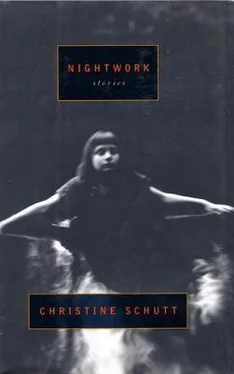The summer houses were shut up for the winter. November, midday, and the black lake level against the yellow shore. “We could go there,” her father said, but they stayed put, in his car, and used the things she brought.
T said, “Even your mother wants it,” and she was surprised.
T said, “Oh, come on, everything you fucking do on that night-shift fucking job is crooked.”
“What do you do,” she asked her father, “when you are not with me?”
He said, “You don’t really want to know,” and he drove her to an unfinished place and pointed. “I have something to do with that.” She saw a building, girders, rags, nets, menacing vacancies. Her father pointed. “Nobody home,” he said, “but that’s not my job.” Rocking the car easy over the scrub-board road, raising dust, her father said, “We’ll never get this thing finished.”
Dust settling on the canvased shapes, Dumpsters and cinder block, the whole wild modern array of it — amazing.
“Amazing,” she said to her father, looking out the window and back at him: the whiteness of his collar against the blaze of neck, the creases darkened, almost black. At his throat, he wore a tie knotted tight as a knuckle.
Maybe he draws the buildings; maybe he warehouses nails and joints, figure-eight pieces, metal supports. Who knows? The way her father palmed the wheel of his fat car, he might very well be a crook with a crook’s car, much like an office, plush and neutral, her father’s make, coppery glitter and paneling that might or might not be real wood. Black and gold buttons for everything; the music on the radio — never clearer. Only decide, decide, please. You pick, no you, was the way she was with her father, first word always yes to everything he asked about. Yes, I did. Yes, I will.
Yes when he surprised her, coming up almost to her house and pointing to a shut eye. “Do you believe my wife did this?” he asked, the good eye blinking and teary and strained. “Can you come out with me for just a while?” Yes.
Yes, Dad: The name warmed her every time she used it to his face, so that she rarely used this name — or any other to his face. Instead, she signaled him. She gave directions in the way she touched him, sometimes saying, “You” and “You” when she was tired and wanted to let him know she would, all he had to do was ask, but not tonight. Tonight she wasn’t feeling well.
“But yes,” she said to her father. She was always saying yes to her father, and only when she was away from him did she wonder. Does this make sense, my father? Driving all the way to her and home again and to her again in a night, driving to where she worked and waiting for her in the lot until the morning — did her father make sense?
“Twice in a night, it happened,” she said to T. “I get confused.”
She said, “But I like what I am doing. I wanted to be in something hard. I wanted to be up all night.”
“You’re so fucking out of it,” T said, and all the other boys said, too. “How do you know one man from another?”
The heavy-lidded eyes, the brittle hair and color of her father: first off, these things, and his voice she knew. The juicy sweetness of his voice when her father was drinking, the way even the words came unbuttoned, the way he said her name, she could be done in by this much about him.
Also the money he gave her — and why not? — presents between the covers of oversized matches: Don’t strike in gold from O’ Something’s bar.
“Are these from us?” she asked her father, holding up matches. “Have we been here?”
“You,” she said, in the car again, free to speak and ready — even her earlobes oiled, every part of her clean and cleaned. She could get off looking at and petting the hair on her arms. “I don’t understand,” she said. “What are you doing with a wife who beats you?”
“Oh,” her father said, and he was sad, or he was tired. Hard to give it up, the look out onto water, someplace to go. Neighbors far apart on either side — not seen until the winter, then sighted in the forked spaces: women standing at windows waiting to be seen. “But it is hard to see them,” her father said. “The glare hurts my eyes, and the bog of common plants — the sappy heart-shaped greeny danglers — beads the windows. Nothing happens, besides,” he said. “I don’t know why the wife is jealous.”
She said, “The light in rooms like that puts me to sleep. I know the daughters,” she said. From schools and summers, she knew them, diving for soap chips in the boathouse, she and the daughters playing to know what it felt like. The winner held the soap between her legs the longest — oh, yes, she remembered everything about this game. The way it ticked inside of her. “I wanted to melt down soap,” she said. “But all of us girls got to play,” she said. “We all got to fold our hands over the burning part.”
They switched places. Her father tipped the seat and shut his eyes. She said, “I’m my mother’s daughter. I want more than others.” The way it was for her to wake up in the morning: The reason you think you have been here is you have been here. “I don’t want it the same,” she said.
“Everyone I know is broke,” she said. “The night shift doesn’t pay much. My boyfriends never work.”
“And your mother?” her father asked when she had already told her stories: grandfather and uncles making house calls on her mother and scolding the poor woman before they made it better, every day less charmed by her mother, opening their wallets, saying, “This has got to stop. There is only so much we can take.”
“Do you remember at all? Do you remember her at all?” She said, “Nothing has changed.”
Her father said, “I can’t get excited when I think about your mother.”
“I am shivering,” she said, and he was, too. She could see the cold in his shoulders and in her arms resting on his shoulders; and both of them, she and her father, white, blue-white — November still — and the horizon cindered thin, burnt-out, quite black. She put her bare foot against the car door window and said, “Look at my leg.” No-color sky, battered grasses. After a while, she asked, “Is this doing anything for you?”
Her father smiled. He said, “I’ve had better,” which made her laugh, his saying, when what did he know?
“Just ask me how many times,” she said. “I couldn’t tell you.”
She said, “I’m always in love with someone.”
Her father said he meant it, he was tired, and she put her hands on his face to feel the bristle grown in driving just to get away — a day, a night, another day, as he had said.
“We don’t have to do anything,” she said.
Her father asked her, “Do you think I look young, or do you think I look like some old guy who got his eyes done cheap?”
“Look at my feet,” she said, parked near the boat launch to a lake they didn’t know, iced over, gray-white, no clear shoreline. “Look at the footmarks I’ve left on the window.”
“Such white feet,” her father said, and he put his foot over hers.
“Have I told you this before?” she asked.
But T didn’t answer, bapping pencils against her head and dancing to his made-up music.
Her father said, “Find some music.”
“Not that,” her father said. “And no to that, no, no”; then he forgot about the music or was indifferent to it; she could stop at anything she liked.
“But do you like it?” she asked her father.
• • •
“Do you like this dress?” she asked. “These shoes?”
Her father said, “It’s hard for me to see. My eye still hurts.” So she drove again, and she told her father what it was as they passed it, and in what connection to him were these women at the end of narrow drives in houses near the water. She spoke of aproned Annes and pretty Susies. “You knew them,” she told her father.
Читать дальше












